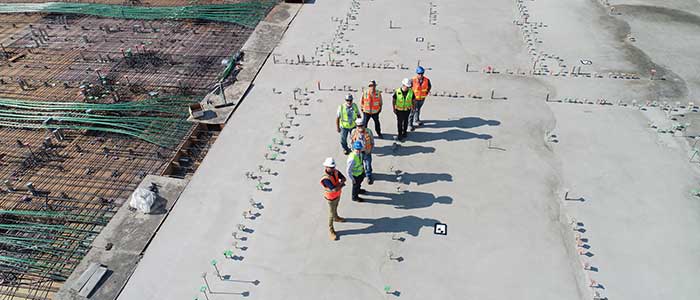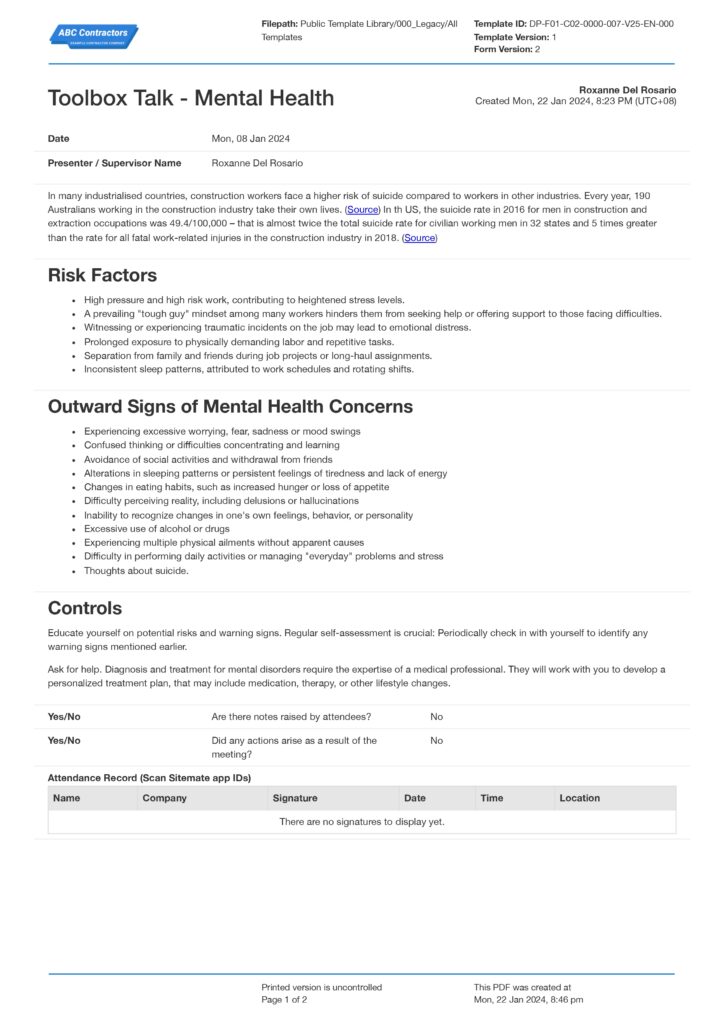Dashpivot Article – Mental Health in the Construction Industry

Mental Health in the Construction Industry
Why Prioritise Mental Health in the Construction Industry?
Prioritising mental health in the construction industry is necessary to foster a safe, supportive, and sustainable workplace. This practice benefits both the workers and the entire organisation.
The construction industry experiences high levels of stress, deadlines, physical demands, long hours of shifts, noisy work environment, field work, and many more which ultimately lead to common conditions like depression and anxiety.
With construction projects prone to accidents and hazards, in the event of accidents involving workers, mental health issues also increase. This also leads to distracted employees, absenteeism, impaired decision-making, and high cases of employees quitting.
Organisations and employers are mandated to care for their employees' mental health. It is both a legal and ethical responsibility to ensure the workplace is free of hazards and mental stressors.
What is the Present State of Workplace Mental Health Awareness in the Construction Workplace?
Over the years, mental health awareness has gained more visibility and notable improvement in the construction industry. There are noticeable efforts in various companies and advocacy groups that implement programs for mental health awareness and provide support in addressing mental health issues.
Regulatory bodies in some countries have also implemented regulations that mandate employers to raise mental health awareness and include mental health as a part of workplace safety, and companies have included employee assistance services, first aid training in mental health, and mental health discussions in their programs and training.
Comparing the rates of mental health issues between industries, the construction industry still remains to be one with the highest suicide rates. Even with the awareness and programs in place, many workers and employees still struggle with issues on their own.
Neglecting mental health issues in some parts of construction sites discourage many workers to seek help. Furthermore, not all companies have access to mental health services. Smaller firms and organisations may not have the resources available and cripples workers from assistance services. There is still so much to improve in raising awareness and reduce stigma around mental illnesses.
What are the Common Mental Health Challenges for Construction Workers?
Many factors cause and contribute to the high cases of mental health challenges among construction workers and employees due to the nature of the work. Here are some of the common mental health challenges in the construction industry.
Mental Health in the Construction Industry from Stress, Burnout, Anxiety, and Depression
When workers and employees are pressured to meet tight deadlines, operating under demanding labour, working with complex tasks, and working in unsafe work conditions cause stress, burnout, anxiety, and depression. With long hours at work and even working beyond working hours can lead to extreme stress. In some cases, employees still work even when they’re at home just to meet deadlines. In some cases, where workers are isolated and away from their families and homes, these can lead to depression and loneliness. And if workers feel like they don’t have control over their work and time, they might feel undervalued, which contribute to the feeling of depression.
Substance Misuse/Chemical Dependency
Most workers turn to substances to cope with stress, depression, burnout, anxiety, and struggles. Chemical dependency affects work performance and the workers' personal lives, and can become a significant mental health issue.
Post-Traumatic Stress Disorder (PTSD)
Workers who have been in work-related accidents or near misses, or just witnessed an accident or death, may experience PTSD. The construction industry deals with high-risk sites, with workers being faced in dangerous and life-threatening situations even with safety protocols in place. Traumatic experiences have long-lasting effects that affect workers' mental health and performance.
Sleep Disorders
Construction workers have irregular working hours and shifting schedules, and sometimes they work overtime to meet deadlines. These can interfere with their sleeping schedule. Not having enough sleep worsens mental health issues like stress, depression, and anxiety.
What Stressors Does the Construction Industry Face?
The construction industry faces multiple stressors that affect the mental health of construction workers. These stressors also similarly affect the overall company performance. Projects have tight deadlines and strict timelines that need to be fulfilled under extreme pressure from clients and customers. Unexpected delays and issues will cause a lot of stress among persons involved, especially when most tasks seem to be urgent. Construction work is physically demanding and dangerous, and workers are exposed to harsh conditions, hazards, lifting, and long hours at work.
With workers at risk for injuries and accidents, safety concerns can cause extreme anxiety and fear for their lives. Project sites are also always at risk for unpredictable work conditions like the weather and natural calamities.
Additionally, if there is poor communication between workers, managers, contractors, and other stakeholders while communicating safety hazards and issues, it could lead to frustration and stress. The financial pressures of independent contractors are also factors in the construction industry.
Employers and organisations should ensure that mental health support is addressed, the safety protocols are implemented and improved, and that a safe and supportive work culture is fostered.
What Mental Health Programs Exist in the Construction Industry?
The construction industry has already implemented programs that address mental health awareness and reduce stigma in the industry. Employee Assistance Programs offer support services, private counselling by mental health professionals, legal assistance, and financial counselling to employees.
Another is First Aid Training in Mental Health by training employees and workers to recognise the signs of a person having mental health struggles, how to offer support, and lead them to professional help.
Wellness Programs focus on stress management workshops, exercise, physical fitness, and mindfulness training. And one of the most helpful ones are Mental Health Toolbox Talks.
A toolbox talk focusing on mental health is an informal on-site discussion that centres on raising awareness about mental health and educating workers on site on maintaining a supportive culture within the workplace.
How can Mental Health be Talked About?
A toolbox talk is an onsite session usually held during the day when all workers on site are present and discuss on topics and conversations, and is arguably the best format for keeping mental health in the construction industry front of mind.
A mental health toolbox talk focuses on raising awareness on mental health illnesses in the construction site or project. This should be integrated into the regular routines in the workplace to fully implement a prevention-oriented mindset in addressing mental health challenges.
This typically lasts about 15–20 minutes before everyone starts on their tasks. It’s led by trained mental health professionals, or supervisors, and is tailored to address the challenges in that specific project or site. It’s a talk that promotes a safe space for workers to discuss mental health issues, and is mainly intended to reduce the stigma on mental health problems.

Improve your mental health toolbox talks with free and customisable forms
How Can Dashpivot Support Workplace Mental Health Communication, Toolbox Talks, and Other Documents?
With all the stressors, factors, and challenges workers face on a day-to-day basis in the workplace, organisations and employers should ensure that tools that aid in mental health awareness in construction and other construction documents should be simple and accessible.
Your company’s mental health toolbox talks can be streamlined by using Dashpivot.
Dashpivot offers features that make filling out toolbox talks easy, simple, and fast. Normally, the traditional way of documenting toolbox talks is using paper and facilitators record all details, topics, attendees' names manually, key points, and action items. It’s a bothersome procedure and takes a lot of time. But with Dashpivot, you can create your standardised and custom Mental Health Toolbox Talk forms by the drag-and-drop feature. Add prefilled lines, text boxes, tables, photo and video section, sketches, notes, and even include an e-signature portion for attendance. Use forms on-the-go using your mobile phone or tablet and enter data while the toolbox talks in ongoing. Like an attendance form, there’s a feature for a no touch scan and sign. You can use digital ID cards via the Sitemate mobile app and simply use the front selfie camera to scan the IDs. It’s convenient and accessible. All your toolbox talks will be stored in a secured database where you can retrieve information whenever and wherever. You can layer permissions across the folders and documents to ensure no one can accidentally delete or edit your files. It’s the perfect digital tool to ensure a seamless mental health toolbox talk and aid in workplace mental health communication.
Aside from the mental health toolbox talks, Dashpivot can also support other documents that relate to mitigating the stressors, and physical and mental risks on site. These documents could be safety-related documents like Site-Specific Safety Plans, Job Hazard Analysis, Material safety Data Sheets and Emergency Response Plans; health-related documents like Health and Safety Policies; training records like Safety Training Logs, other Toolbox Talks, and Compliance Checklists, and; legal and regulatory documents, compliance, and audit forms. These all can be streamlined by using Dashpivot’s drag-and-drop form feature, information management system, and powerful and flexible forms/documents building blocks.

Safety Toolbox Talk template
This toolbox talk template is quick and easy to complete and signoff on site, and keeps all of your toolbox talks neatly organised and professional.

Safety Moments template
Record your safety moments meeting summary and discussion points, add notes, create action items, and record attendance.

Fatigue Management Report template
Ensure you have identified your risk factors and are monitoring your fatigue management processes.

